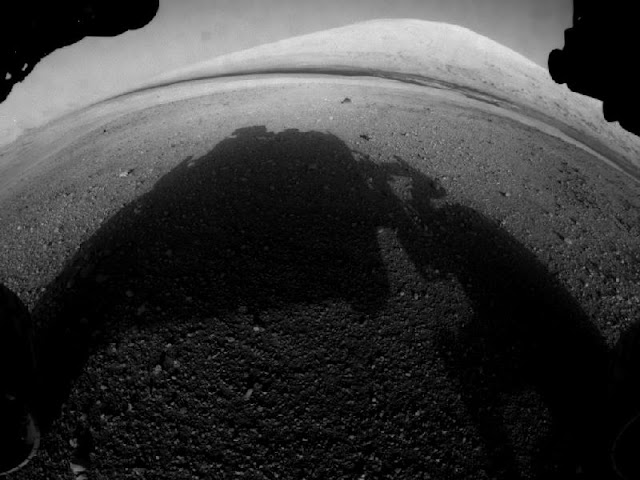b.a#15
First Day On Mars
Curiosity has woken for its first day on a foreign planet.
On the cool and crisp surface of Mars, the NASA rover began its first solar
day, Sol 1, about 9.45am Mars time (10.45am AEST).
Another of the first images beamed back from NASA's
Curiosity rover on August 6 is the shadow cast by the rover on the surface of
Mars
"What's really exciting is the rover is in this new place
and is going to teach us about this new landing site," Jennifer Trosper, a
mission manager with NASA's Jet Propulsion Laboratory in Pasadena, said.
This image shows Curiosity's main science target, Mount
Sharp. The rover's shadow can be seen in the foreground. The dark bands in the
distances are dunes.
The rover's day one tasks include instrument "health
checks" and communications tests with two of the rover's antennae.
"We want to make sure we have as many communications links as
possible," Ms Trosper said.
The rover communicates with Earth by relaying data through the Mars Odyssey and Mars Reconnaissance Orbiters, but it also has the capacity to listen and talk directly to Earth.

Another of the first images taken by the rover. The clear dust cover that protected the camera during landing has popped open. Part of the spring that released the dust cover can be seen at the bottom right, near the rover's wheel
The rover communicates with Earth by relaying data through the Mars Odyssey and Mars Reconnaissance Orbiters, but it also has the capacity to listen and talk directly to Earth.

Another of the first images taken by the rover. The clear dust cover that protected the camera during landing has popped open. Part of the spring that released the dust cover can be seen at the bottom right, near the rover's wheel
This morning NASA will send a command into the rover's
low-gain antenna, an "omni-directional" antenna that will be used
primarily for receiving signals. "That command is going to start the
activities for the day," Ms Trosper said.
This is one of the first pictures taken by Curiosity after
it landed. It shows the rover's shadow on the Martian soil.
One of those activities will be deploying the high-gain
antenna, which will be used to receive commands for the mission team back on
Earth.
As Earth rises, the high-gain antenna will track the Earth
from about 11.45am local Mars time for about 75 minutes.
"If that all goes well then we will have confirmed all
our communications links work perfectly and that would be fantastic," she
said.
This view of the landscape to the north of NASA's Mars rover Curiosity was acquired by the Mars Hand Lens Imager on Monday afternoon, the first day after landing.
This view of the landscape to the north of NASA's Mars rover Curiosity was acquired by the Mars Hand Lens Imager on Monday afternoon, the first day after landing.
"That's one of the main engineering objectives that
we're trying out on the first few Sols."
The rover has already used its descent imager, MARDI.
This image is a 3-D view in front of NASA's Curiosity rover. The anaglyph was made from a stereo pair of Hazard-Avoidance Cameras on the front of the rover. Mount Sharp, a peak that is about 3.4 miles high, is visible rising above the terrain, though in one "eye" a box on the rover holding the drill bits obscures the view.
After that, Curiosity will conduct checks on two of its 10
scientific instruments including the RAD, which measured high-energy radiation
during the spacecraft's flight, but was turned off during descent and REMS, the
rover's Martian weather station.
This image is a 3-D view in front of NASA's Curiosity rover. The anaglyph was made from a stereo pair of Hazard-Avoidance Cameras on the front of the rover. Mount Sharp, a peak that is about 3.4 miles high, is visible rising above the terrain, though in one "eye" a box on the rover holding the drill bits obscures the view.

















0 comments:
Post a Comment